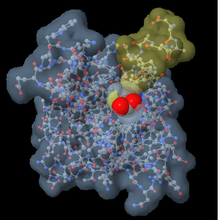
Jmol
Open-source Java viewer for 3D chemical structures / From Wikipedia, the free encyclopedia
Dear Wikiwand AI, let's keep it short by simply answering these key questions:
Can you list the top facts and stats about JSmol?
Summarize this article for a 10 year old
SHOW ALL QUESTIONS
For the legal procedure, see Judgment as a matter of law.
Jmol is computer software for molecular modelling chemical structures in 3-dimensions.[2] Jmol returns a 3D representation of a molecule that may be used as a teaching tool,[3] or for research e.g., in chemistry and biochemistry.
Quick Facts Developer(s), Initial release ...
 | |
 Jmol three-dimensional structure rendering of streptavidin | |
| Developer(s) | Jmol development team |
|---|---|
| Initial release | 2001; 23 years ago (2001) |
| Stable release | |
| Repository | sourceforge |
| Written in | Java |
| Operating system | Cross-platform |
| Platform | Systems with Java and Web browsers without Java |
| Available in | 16 languages |
List of languages Catalan, Chinese, Czech, Danish, Dutch, English, French, German, Hungarian, Indonesian, Italian, Korean, Portuguese, Spanish, Turkish, Ukrainian[1] | |
| Type | Molecular modelling |
| License | LGPL 2.0 |
| Website | www |
Close